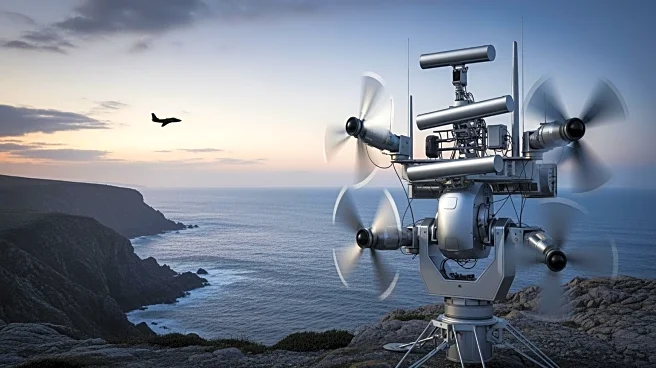What's Happening?
Russia has deployed a military spy plane over disputed islands in the Far East near Japan, where both Moscow and Tokyo claim sovereignty. The Japanese Defense Ministry reported that the Russian Il-20 intelligence-gathering
aircraft was spotted flying over the Sea of Japan and the Sea of Okhotsk near Hokkaido on October 10. The aircraft was tracked flying off the western, northern, and eastern coasts of Hokkaido, as well as over two of the four disputed Kuril Islands. Japan's Air Self-Defense Force scrambled fighter jets in response to the Russian plane, which approached from Sakhalin Island. The incident highlights ongoing tensions between Russia and Japan over the Northern Territories, which were seized by the Soviet Union at the end of World War II.
Why It's Important?
The deployment of Russian military aircraft near Japan underscores the strategic importance of the region and the ongoing geopolitical tensions. Japan, a key ally of the United States, is part of Washington's island chain strategy aimed at countering Russian and Chinese influence in the Pacific. The presence of Russian aircraft near Japan's territorial waters and airspace poses a challenge to regional security and stability. Japan has been strengthening its defenses, acquiring F-35 stealth fighter jets and deploying the Patriot air and missile defense system. The situation also reflects broader international concerns about Russia's military activities, particularly in light of its ongoing aggression against Ukraine.
What's Next?
Russia is expected to continue its military activities in the Far East, maintaining pressure on Japan and other regional stakeholders. Japan is scheduled to conduct a large-scale war game across the country later this month, which may serve as a demonstration of its military readiness and resolve. The ongoing disputes over the Northern Territories are likely to remain a point of contention between Japan and Russia, with potential diplomatic and military implications. The United States may continue to support Japan's position, reinforcing its strategic alliance in the region.
Beyond the Headlines
The situation raises ethical and legal questions regarding sovereignty and territorial rights, as both Japan and Russia claim ownership of the disputed islands. The historical context of the Soviet Union's seizure of the islands adds complexity to the issue, influencing current diplomatic relations. The military activities in the region could also impact cultural and economic exchanges between Japan and Russia, potentially affecting local communities and industries.









